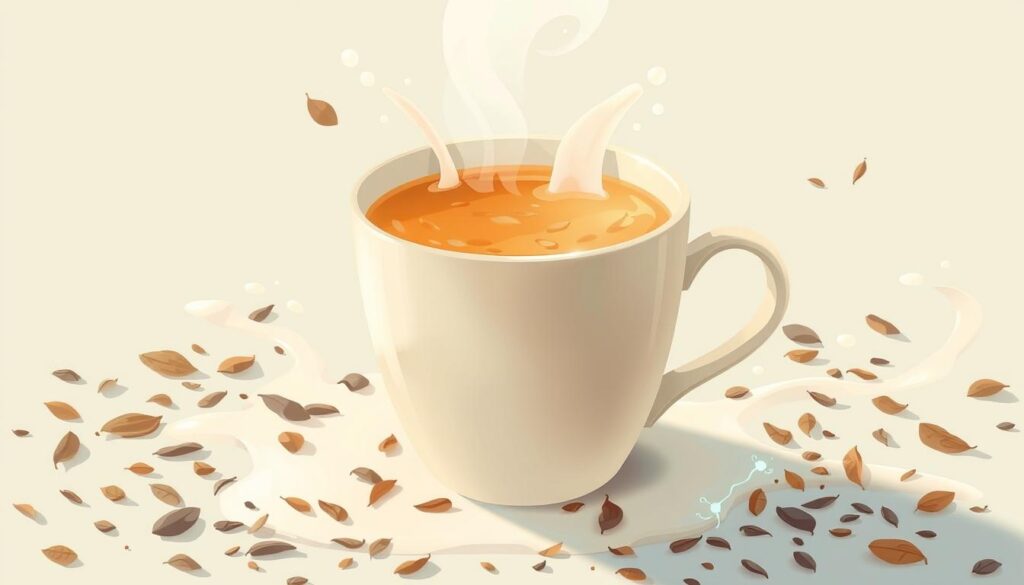Written By: Sherry Harris
Milk tea is becoming more popular, leading to many questions about its ingredients. People often wonder, does milk tea have caffeine? Knowing the caffeine in milk tea is key for those who love it. It helps them understand how it affects their energy and health.
We will dive into the world of milk tea and caffeine. This will help you make better choices about your favorite drink.
Key Takeaways
- Milk tea can contain varying levels of caffeine, depending on the type of tea used.
- Understanding the caffeine content is essential for energy management.
- Different milk tea varieties have unique flavor profiles influenced by their caffeine levels.
- Caffeine sensitivity varies from person to person, impacting their experience with milk tea.
- Exploring decaffeinated options is a great way to enjoy milk tea without caffeine.
Table of Contents
What is Milk Tea?
Milk tea is a mix of brewed tea and milk, creating a comforting drink. It has become very popular in recent years. The blend of flavors and textures makes milk tea stand out from other drinks.
Types of Milk Tea
There are many kinds of milk tea, each with its own taste, way of making, and cultural importance. Some well-known types include:
- Bubble Tea: From Taiwan, it has chewy tapioca pearls, adding a fun texture to the tea and milk.
- Masala Chai: A traditional Indian drink, it combines black tea, spices, milk, and sugar for a flavorful warm beverage.
- Hong Kong-style Milk Tea: Famous for its strong tea and sweetened condensed milk, it’s a favorite in Hong Kong cafes.
Trying different milk teas shows how versatile and adaptable this drink can be, reflecting local tastes and traditions.
Does Milk Tea Have Caffeine?
Many people wonder if milk tea has caffeine. Most milk teas do have caffeine, but the amount can vary. The type of tea used is a big factor. For example, black tea has more caffeine than green tea.
So, if you’re asking does milk tea have caffeine, the answer is yes. But it has less caffeine than coffee. A typical milk tea has 30 to 70 milligrams of caffeine. Coffee, on the other hand, can have up to 95 milligrams or more.
Knowing how much caffeine is in different milk teas is helpful. Here’s a quick guide:
| Type of Milk Tea | Caffeine Content (mg) |
|---|---|
| Classic Hong Kong Milk Tea | 45-60 |
| Masala Chai | 40-70 |
| Boba Milk Tea (with black tea) | 30-50 |
| Green Milk Tea | 20-35 |
When picking a milk tea, think about the caffeine levels. Find one that matches your caffeine needs. Always check the ingredients if you’re sensitive to caffeine. Some teas might have extra caffeine.
Do You Know?
👉 Which Teas Have the Most Caffeine?
👉 Is Green Tea Really Nature’s Ozempic?
Caffeine Basics
Caffeine is a natural stimulant found in plants like coffee and tea. It helps us feel more alert and focused. By blocking a sleep-promoting neurotransmitter, caffeine makes us more awake and sharp.
What is Caffeine?
Caffeine comes from coffee beans, tea leaves, and cacao pods. It’s a stimulant that boosts energy and mood. Many drink it daily for its energizing effects, especially in milk tea.
Health Benefits of Caffeine
Caffeine has many health perks. Here are some:
- Improved cognitive function: It sharpens attention and quickens reactions.
- Increased endurance: It helps athletes perform better during exercise.
- Reduced risks for certain illnesses: It might lower the risk of Parkinson’s disease and some cancers.
Sources of Caffeine in Milk Tea

To understand caffeine in milk tea, we must look at the tea types and flavor enhancers. Each tea has its caffeine level, affecting the drink’s caffeine content.
Types of Tea Used
Milk tea often comes from certain teas, each with its caffeine amount. Here’s a look at the most common tea varieties:
| Type of Tea | Caffeine Content (mg per 8 oz) |
|---|---|
| Black Tea | 40-70 |
| Green Tea | 20-45 |
| Oolong Tea | 30-50 |
| White Tea | 15-30 |
Ingredients in Milk Tea
Milk tea also includes sweeteners and flavorings. These can change the caffeine amount slightly. Common additions are:
- Flavored syrups
- Sweetened condensed milk
- Milk (dairy or non-dairy)
Knowing these sources helps you choose your milk tea wisely. Whether you like strong black tea or light green tea, each choice changes your caffeine experience.
Comparing Caffeine Content
It’s interesting to see how different drinks have different amounts of caffeine. This part will look at how much caffeine is in milk tea compared to coffee and traditional tea. We’ll see how each drink affects our energy and alertness.
Milk Tea vs. Coffee
Coffee and milk tea have different amounts of caffeine. Coffee has about 95 to 200 mg per 8-ounce cup. Milk tea, on the other hand, has 30 to 70 mg in the same size.
Coffee gives a strong energy boost. But milk tea offers a gentler increase in alertness. This makes milk tea great for those who don’t like too much caffeine.
Milk Tea vs. Traditional Tea
Traditional teas like black or green tea have about 20 to 60 mg of caffeine per cup. Milk tea, made with these teas, can have more caffeine because of the milk and flavorings.
For example, milk tea with strong black tea might have more caffeine than green tea. But it tastes creamier and richer. This helps people choose based on how much caffeine they want and the taste they like.
Factors Affecting Caffeine Levels

Knowing what affects caffeine in milk tea is key for those watching their caffeine intake. Several things influence how much caffeine is pulled out and how it mixes with other ingredients. Brewing time and the type of milk used are the most important factors.
Brewing Time
How long tea leaves steep is crucial for caffeine content. Longer steeping times mean more caffeine is pulled out. Most recipes suggest steeping for 3 to 5 minutes. But, some like it longer for a stronger flavor and caffeine kick.
Type of Milk Used
The milk you choose can change the taste and how caffeine is absorbed. Whole milk, almond milk, and cream each offer a unique taste and texture. For example, whole milk’s fat content might slow down caffeine digestion, changing how you feel it.
| Type of Milk | Caffeine Effect | Flavor Profile | Texture |
|---|---|---|---|
| Whole Milk | May slow caffeine absorption | Rich and creamy | Full-bodied |
| Almond Milk | Less influence on caffeine | Nutty and light | Smooth |
| Cream | Potentially delays caffeine effects | Decadent and rich | Luxurious |
Decaffeinated Options
Decaffeinated milk tea is a great choice for those who love tea but don’t want caffeine. It lets you enjoy your favorite drink without the caffeine buzz. Knowing what decaffeinated milk tea is can make your experience better and help you choose wisely.
What is Decaffeinated Milk Tea?
Decaffeinated milk tea is made by taking most of the caffeine out of regular tea leaves. There are different ways to do this, like the water process and the CO2 method. You can find it in classic black tea, green tea, and many flavors to suit everyone’s taste.
Health Benefits of Decaffeinated Milk Tea
Decaffeinated milk tea has some great health perks. It’s perfect for those who can’t handle caffeine because it helps avoid anxiety and improves sleep. It also has:
- Rich in antioxidants.
- Supports hydration without the stimulant effects.
- May enhance digestive health.
These benefits make decaffeinated milk tea a great pick for anyone who wants to enjoy tea’s taste without caffeine’s effects. It’s perfect for an evening drink or as part of a calming routine. Decaffeinated milk tea options suit many tastes.
| Decaffeination Method | Description | Flavor Impact |
|---|---|---|
| Water Process | Uses water to extract caffeine while retaining flavor compounds. | Mildly affected; retains most of the original taste. |
| CO2 Method | Employs carbon dioxide to selectively remove caffeine. | Maintains strong flavor; often considered high quality. |
| Solvent Method | Utilizes chemical solvents for caffeine extraction. | Varies based on the solvent used; may alter flavor. |
Do You Know?
👉 Does Raspberry Tea Have Caffeine?
👉 Does Chrysanthemum Tea Have Caffeine?
How Caffeine Influences Your Body
Caffeine boosts energy and mood. It works by blocking adenosine receptors, which make us feel tired. This makes us feel more alert and awake.
But, too much caffeine can cause jitters or restlessness. It’s important to drink it in moderation.
Effects on Energy Levels
Many studies show caffeine increases energy. People often feel more alert and focused after drinking it. This is because it helps improve brain function.
But, too much caffeine can cause anxiety or trouble sleeping. It’s important to know how caffeine affects you. This way, you can enjoy it without negative effects.
Caffeine Sensitivity in Individuals
How caffeine affects you depends on many things. These include your genes, weight, and how often you drink it. Some people get energized with a little caffeine, while others get nervous or can’t sleep.
Knowing your caffeine limit is key. What’s okay for one person might be too much for another. Paying attention to how caffeine affects you helps you enjoy it safely.
FAQ
Does milk tea have caffeine?
Yes, milk tea usually has caffeine. The amount can change based on the tea type and brewing method. But it’s generally less than in coffee.
What types of tea are used in milk tea?
Milk tea often uses black, green, or oolong tea. Each type has different caffeine levels. This affects the milk tea’s caffeine content.
How does brewing time affect caffeine levels in milk tea?
Longer brewing times pull more caffeine from the tea leaves. This makes the milk tea more caffeinated.
Are there decaffeinated options for milk tea?
Yes, there are decaf milk tea options. They let you enjoy the flavor without caffeine’s effects.
What are the health benefits of caffeine?
Drinking moderate amounts of caffeine can make you more alert. It also boosts brain function and endurance. Plus, it might lower disease risks.
How does milk tea compare to coffee in terms of caffeine content?
Coffee has more caffeine, but milk tea still offers a nice energy boost. It’s a good choice for those who want less caffeine.
How do the ingredients in milk tea affect its caffeine content?
The tea type and added syrups and sweeteners impact milk tea’s caffeine. Different ingredients can change how caffeine is absorbed.
What is the effect of different types of milk on caffeine absorption?
Using different milks, like whole or almond milk, can change milk tea’s taste. It might also affect how caffeine is absorbed in the body.
What is caffeine sensitivity, and how does it affect individuals?
Caffeine sensitivity varies among people. Some feel more alert, while others get jitters or anxiety. Knowing your sensitivity is key.
Can consuming decaffeinated milk tea offer health benefits?
Yes, decaf milk tea can reduce anxiety and improve sleep. It’s a great choice for those sensitive to caffeine but still want a tasty drink.

